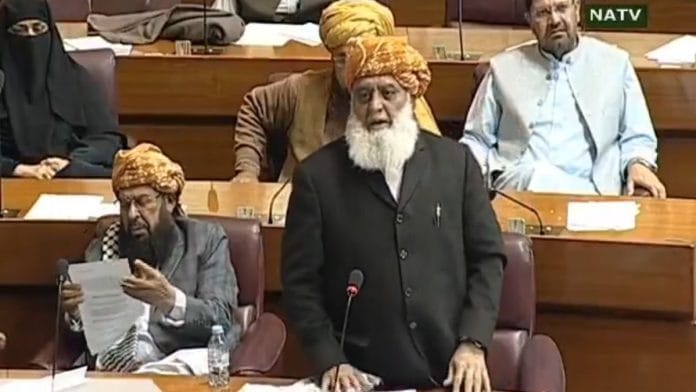New Delhi: Pakistani politician and cleric Maulana Fazlur Rehman recently claimed that the Pakistan government had lost control of Khyber Pakhtunkhwa and Balochistan. His speech, delivered in the National Assembly on 18 February, left the Baloch amused, who responded by saying that the “people of the region do not care for his views”.
Fazlur Rehman, leader of Jamiat Ulema-i-Islam-Fazl (JUI-F), expressed grave concerns over the state of affairs in the provinces of Balochistan and Khyber Pakhtunkhwa. He claimed that in Balochistan, certain districts were already functioning without the presence of police or military forces, and cautioned that if 5 to 7 districts in the region declared independence, Pakistan would be powerless to intervene.
The situation in KPK is equally dire, according to Fazlur Rehman, who described the province as having “no government at all.” He noted that police stations were closed, and the region was under the control of the Tehreek-e-Taliban Pakistan (TTP).
“There are areas where the state’s control has vanished,” he stated.
Rehman, who has long been a supporter of the Pakistani military, said that a moment similar to the 1971 Bangladesh Liberation War was upon Pakistan. He warned that if Balochistan districts declared independence, the United Nations could recognise their sovereignty, leading to Pakistan’s fragmentation.
He criticised the government in Islamabad for failing to address the growing instability and accused the Army and the ISI of taking “brutal decisions” resulting in the deaths of countless people in Balochistan and KPK.
“The entire government of Pakistan has failed, and the country is on the verge of losing two states,” he warned in his speech in the National Assembly.
Sardar Akhtar Mengal, chairman of Balochistan National Party, told ThePrint that the state’s treatment of the Baloch people aligns with Rehman’s statement. He said that the enforced disappearances across Balochistan have created an environment of deep resentment and alienation.
“While there may not be an official referendum on independence, one can assert with confidence that, given the opportunity, the majority would not choose to remain within Pakistan. The responsibility for this growing discontent rests solely with the establishment, whose actions have fuelled a sense of political and social estrangement among the Baloch population,” Mengal said.
Rehman’s speech comes amid violence in KPK’s Kurram region, where ongoing Sunni-Shiite conflicts have killed over 150 people since November. The region, which borders Afghanistan, has been isolated by the fighting, further complicating efforts to restore order.
Also read: Extremist groups gather in PoK – Jaish, Lashkar, even Hamas
The Balochistan question
Taj Baloch, founder of the Human Rights Council of Balochistan, refuted Rehman’s claims, noting that mineral extraction and other activities continue undisturbed in the province.
“Pakistan has never cared for the people of Balochistan, and neither does Fazlur Rehman,” Baloch told ThePrint.
However, political analyst and economist Javed Hassan disagreed.
“Few people have a better appreciation of the sentiments among the people of KPK and Balochistan than Maulana Fazlur Rehman. His views should be heard carefully,” he told ThePrint.
Balochistan, Pakistan’s largest but least-populated province, has been in turbulence for the past few years. Since 2005, the Pakistani military has been engaged in a brutal crackdown on Baloch nationalist movements, stoking ethnic and sectarian violence.
The lack of effective governance and security forces’ repression of the Baloch nationalist movement has weakened any social structures that might have contained the rise of extremism. This power vacuum is exacerbated by the province’s proximity to Afghanistan, making it a highly volatile area, a 2013 research paper published in Carnegie noted.
Meanwhile, the grand vision for Gwadar as a hub of economic growth through the China-Pakistan Economic Corridor (CPEC) has been met with significant resistance from the local community in Balochistan. Despite being hailed as a development project that would bring prosperity to one of Pakistan’s poorest provinces, CPEC has instead fueled growing resentment among the people of Gwadar and the wider region.
When CPEC was launched in 2015, it was promised that the project would bring rapid economic growth and job creation to Balochistan, with projections of two million jobs. However, fewer than 2,50,000 jobs have materialised, and many of these opportunities have been lost due to delays and stagnation in the development of key infrastructure. For the local population, the benefits have remained elusive, while Gwadar’s abundant natural resources—such as oil, coal, and gold—are yet to translate into tangible improvements in living conditions.
The residents of Gwadar have been displaced to make room for mega projects like the Gwadar Port, but basic services like clean water, electricity, and healthcare remain severely lacking. This disparity has led to regular protests, with Baloch citizens accusing both the Pakistani government and Chinese investors of neglecting their most fundamental needs.
“When it comes to law and order, Pakistan has never come together to consider the people of Balochistan. Like others, Fazlur Rahman has always supported the Pakistan military. All the leaders talk about the military and the police, but they never care about what the people think,” Taj Baloch said.
(Edited by Aamaan Alam Khan)






